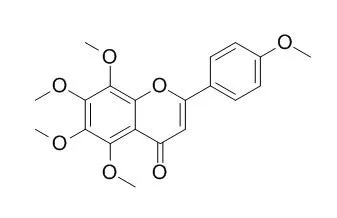| Description: |
Tangeretin is a Notch-1 inhibitor, has antiproliferative, antiinvasive, antimetastatic and antioxidant activities.Tangeretin has therapeutic potential for melanoma and melanoma-associated depigmentation, because it can induce hyperpigmentation through the activation of melanogenic signaling proteins and initiation of sustained ERK2 expression. |
| Targets: |
ERK | NO | Tyrosinase | Notch-1 | Jagged1/2 | Hey-1 | Hes-1 |
| In vitro: |
| Nat Prod Commun. 2015 Mar;10(3):389-92. | | Tangeretin triggers melanogenesis through the activation of melanogenic signaling proteins and sustained extracellular signal- regulated kinase in B16/F10 murine melanoma cells.[Pubmed: 25924512] | In order to test the effectiveness of Tangeretin at ameliorating melanoma and melanoma-associated depigmentation, western blotting was used to assess the melanin content of treated melanoma cells.
METHODS AND RESULTS:
Tangeretin, a 4',5,6,7,8-pentamethoxyflavone, was found to trigger intracellular melanin production in a concentration-dependent manner in B16/F10 murine melanoma cells. Melanin content increased 1.74-fold in response to treatment with 25 μM of Tangeretin, compared to that in non-treated cells. Examination of melanogenic protein expression showed that tyrosinase, tyrosinase-related protein (TRP)-1, and extracellular signal-regulated kinase (ERK) 1/2 levels increased in a dose-dependent manner. Furthermore, the expression of cyclic adenosine monophosphate response element binding protein (CREB) and microphthalmia transcription factor (MITF) was increased by Tangeretin in 1 h and 4 h, respectively. Tangeretin- upregulated melanogenesis was suppressed by ERK 1/2 inhibitor and not by ERK1 inhibitor.
CONCLUSIONS:
These results suggest that Tangeretin has therapeutic potential for melanoma and melanoma-associated depigmentation because it can induce hyperpigmentation through the activation of melanogenic signaling proteins and initiation of sustained ERK2 expression. |
|
| In vivo: |
| Oncol Rep. 2015 Jul;34(1):302-10. | | Tangeretin enhances radiosensitivity and inhibits the radiation-induced epithelial-mesenchymal transition of gastric cancer cells.[Pubmed: 25998143] | Irradiation has been reported to increase radioresistance and epithelial-mesenchymal transition (EMT) in gastric cancer (GC) cells. The Notch pathway is critically implicated in cancer EMT and radioresistance. In the present study, we investigated the use of a Notch-1 inhibiting compound as a novel therapeutic candidate to regulate radiation-induced EMT in GC cells.
METHODS AND RESULTS:
According to previous screening, Tangeretin, a polymethoxylated flavonoid from citrus fruits was selected as a Notch-1 inhibitor. Tangeretin enhanced the radiosensitivity of GC cells as demonstrated by MTT and colony formation assays. Tangeretin also attenuated radiation-induced EMT, invasion and migration in GC cells, accompanied by a decrease in Notch-1, Jagged1/2, Hey-1 and Hes-1 expressions. Tangeretin triggered the upregulation of miR-410, a tumor-suppressive microRNA. Furthermore, re-expression of miR-410 prevented radiation-induced EMT and cell invasion. An in vivo tumor xenograft model confirmed the antimetastasis effect of Tangeretin as we observed in vitro. In nude mice, tumor size was considerably diminished by radiation plus Tangeretin co-treatment. Tangeretin almost completely inhibited lung metastasis induced by irradiation.
CONCLUSIONS:
Tangeretin may be a novel antimetastatic agent for radiotherapy. |
|






 Cell. 2018 Jan 11;172(1-2):249-261.e12. doi: 10.1016/j.cell.2017.12.019.IF=36.216(2019)
Cell. 2018 Jan 11;172(1-2):249-261.e12. doi: 10.1016/j.cell.2017.12.019.IF=36.216(2019) Cell Metab. 2020 Mar 3;31(3):534-548.e5. doi: 10.1016/j.cmet.2020.01.002.IF=22.415(2019)
Cell Metab. 2020 Mar 3;31(3):534-548.e5. doi: 10.1016/j.cmet.2020.01.002.IF=22.415(2019) Mol Cell. 2017 Nov 16;68(4):673-685.e6. doi: 10.1016/j.molcel.2017.10.022.IF=14.548(2019)
Mol Cell. 2017 Nov 16;68(4):673-685.e6. doi: 10.1016/j.molcel.2017.10.022.IF=14.548(2019)